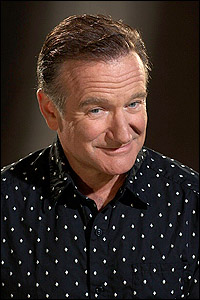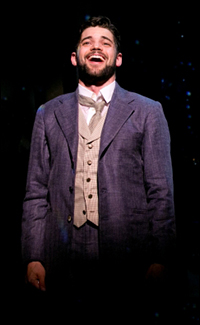
Legend (and, unlike many others who have tried to wear that title, she deserved it) Lauren Bacall, who earned Tony Awards for her performances in the Broadway musicals Applause and Woman of the Year, died at her home in Manhattan Aug. 12 at the age of 89. The leggy, throaty actress was one of the last living emblems of Hollywood's golden years, her name forever linked with that of her first husband and ultimate co-star, Humphrey Bogart.
She was all of 19 when she made her film debut in 1944's "To Have and Have Not," a loose, noirish adaptation of Ernest Hemingway (by William Faulkner), directed by Howard Hawks, in which she starred opposite Bogart for the first time. The actor was nearly 25 years her senior, but they crackled together onscreen, the neophyte going toe to toe with the veteran actor in terms of poise, charm and magnetism. The two were soon an item, and in 1945 they wed and co-starred in three more films.
Her career waned in the 1960s, but she soon found an unlikely new home on Broadway, starring in two musicals tailored to her talents: Applause, Charles Strouse, Lee Adams, Betty Comden and Adolph Green's adaptation of the film "All About Eve"; and Woman of the Year, a John Kander and Fred Ebb show drawn from another old Hollywood film. She was embraced by critics and audiences and won Tony Awards for both performances.
Robin Williams came of professional age during Bacall's second career, in the 1970s, an era that saw the most successful comedians transcend the usual boundaries of their profession and became not just famous, but superstars and, eventually, respected legitimate actors.
Perhaps more than any other comedian of his generation, Robin Williams was known for his near limitless comic fluidity. Jokes, quips, references and impressions burst from his mouth like a seemingly unending string of firecrackers. When performing, he was rarely still, his arms windmilling, his eyes pinwheeling and his mouth caught in a wide, goofy grin, as if he was as amused as he was amusing. Fans, critics and colleagues alike often spoke of laughing more in his presence that in that of any other comedian.
 |
||
| Robin Williams |
***
The Broadway-aimed, ever-shape-shifting, world-premiere musical Finding Neverland, officially opened (at least, this version of it, anyway) Aug. 13 at the American Repertory Theater under the direction of Tony Award-winning director Diane "I Can Fix That Show" Paulus. Jeremy Jordan and Laura Michelle Kelly star in the show, based on the 2004 Miramax film about J.M. Barrie — you know, that guy who wrote that upcoming Allison Williams project, Peter Pan. The new version of the musical has a score by U.K. pop songwriters Gary Barlow and Elliot Kennedy, with a book by James Graham. A previous incarnation of the musical, which featured a score by Scott Frankel and Michael Korie, received a 2012 U.K. premiere.
Variety called it a "sometimes wan but sometimes wonderful new musical" that didn't come alive until the end of the first act, when Barrie finds his story's villain in Captain Hook. "But much more work still needs to be done before this show can fly," the review went on. "While some of the tunes have an easygoing, big-note pop appeal — including the title song, which was previewed on the Tony Awards by Jennifer Hudson (no, she’s not in the show) — others fall in the category of serviceable."
 |
||
| Jeremy Jordan |
||
| photo by Evgenia Eliseeva |
***
"I Want to Be a Producer."
Maxolev Productions, which is led by Howard and Janet Kagan, is hoping that there are a lot of people out there like Matthew Broderick's mousy, would-be-showman from The Producers. The company recently announced the launch of a new online investment platform (invest.maxolev.com), which is offering equity in Broadway productions, beginning with the upcoming revival of On the Town.
The platform is designed to offer accredited investors from across the country an opportunity to become Broadway investors; a portion of the offering of the capitalization of On the Town has been reserved for accredited investors willing to invest a minimum of $10,000.
In a statement Howard Kagan said, "With the theatre industry evolving rapidly, we aim to open up the once-closed circle and invite theatregoers who are accredited investors to invest in what they love, and to share the thrilling, one-of-a-kind experience of backing a Broadway show. By streamlining the investment process and increasing accessibility, we hope to expand the community of Broadway investors, beginning with an opportunity to join in the journey of a major musical revival, On the Town."
Unlike crowdfunding platforms Kickstarter and IndieGogo, the Maxolev online investment platform, according to press notes, offers "equity in its productions, and benefits that match those available to traditional Broadway investors. Prospective investors can research current opportunities at invest.maxolev.com and learn about the Broadway business model. Investors who choose to proceed are able to directly access a secure, custom platform built by Maxolev and Wealth Forge to continue the online investment process."
Get ready to see even more people up on that stage when the Best Musical Tony Award is called out in years to come.










